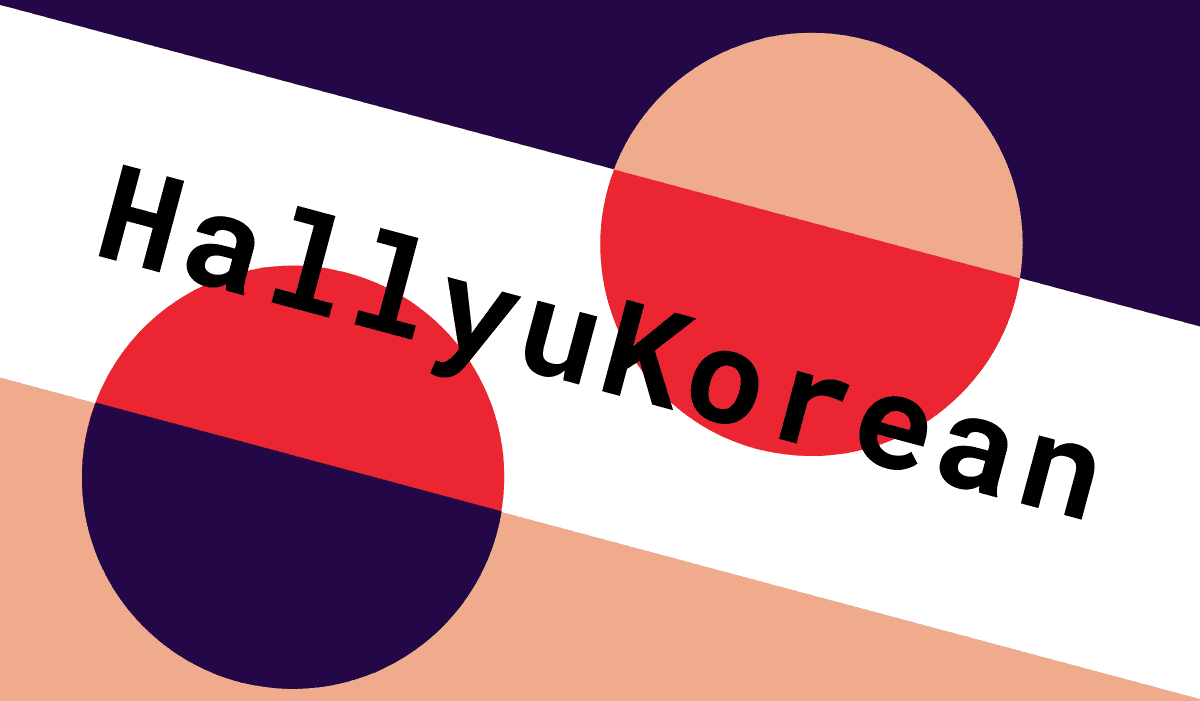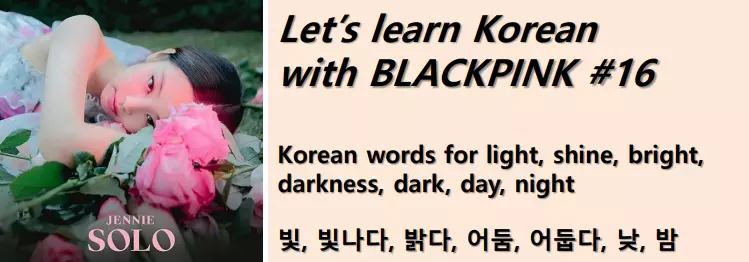Korean words related to light and darkness: 빛, 빛나다, 밝다, 어둠, 어둡다, 낮, 밤, 환하다, 캄캄하다
Let’s learn Korean words related to light and darkness with BLACKPINK lyrics.
Click the play button below to listen to all the BLACKPINK lyrics used in this post.
빛 [bit] light
오늘부터 난 난 난 빛이 나는 솔로
o-neul-bu-teo nan nan nan bit-chi na-neun sol-lo
I’m a shining solo
*오늘(today) + 부터(from) +
난(나(I) + 는(topic particle), =난) + 난(나(I) + 는(topic particle), =난) +
빛(light) + 이(subject particle)
나는(나다(come out) + 는(noun modifier)) +
솔로(solo)
빛나다 [bit-na-da] to shine
밝다 [bal-tta] to be bright
밝게 [bal-kke] brightly
구름 위에 별들처럼 멀리 가고 싶어. 밝게 빛나고 싶어
gu-reum wi-e byeol-deul-cheo-reom meol-li ga-go si-peo. bal-kke bit-na-go si-peo
I want to go far away like the stars above the clouds. I want to shine brightly
*구름(cloud) +
위(top) + 에(on)
별(star) + 들(plural suffix) + 처럼(like) +
멀리(far away) +
가고 싶어(가다(go) + ~고 싶다(want to)) +
밝게(brightly) +
빛나고 싶어(빛나다(shine) + ~고 싶다(want to))
(*Adjective stem + ~게 makes an adjective into an adverb.
~고 싶다 is used to express the speaker’s wishes.)
어둠 [eo-dum] darkness
가끔 어둠이 올 때면 I’ll be your fire
ga-kkeum eo-du-mi ol ttae-myeon I’ll be your fire
Sometimes when the darkness comes, I’ll be your fire
*가끔(sometimes) +
어둠(darkness) + 이(subject particle) +
올(오다(come) + ㄹ(noun modifier)) +
때면(때(time) + 이다(be) + 면(sentence ending), =때면(when))
I’ll be your fire
어둡다 [eo-dup-tta] to be dark
어두운 [eo-du-un] dark
어두운 밤이 날 가두기 전에 내 곁을 떠나지 마
eo-du-un ba-mi nal ga-du-gi jeon-e nae gyeo-teul tteo-na-ji ma
Don’t leave me before the dark night traps me
*어두운(어둡다(to be dark) + ㄴ(noun modifier)) +
밤(night) + 이(subject particle) +
날(나(I) + 를(object particle), =날) +
가두기(가두다(lock up) + ~기)
전에(before) +
내(나(I) + 의(of), =내) +
곁(side) + 을(object particle) +
떠나지마(떠나다(leave) + ~지마(don’t))
(*Adding ~기 to a verb stem makes the verb a noun.)
낮 [nat] day, daytime
낮에도 이 밤에도 이렇게 너를 원해 ooh ooh
na-je-do i ba-me-do i-reo-ke neo-reul won-hae ooh ooh
All day, all night, I want you like this, ooh ooh
낮(day) + 에도(also) +
이(this) +
밤(night) + 에도(also) +
이렇게(like this) +
너(you) + 를(object particle) +
원해(want)
밤 [bam] night, nighttime
밤은 왜 더 어두울까?
ba-meun wae deo eo-du-ul-kka?
Why is the night darker?
밤(night) + 은(topic particle) +
왜(why) +
더(more) +
어두울까?(어둡다(be dark) + 을까(is it?))
(*~ㄹ/을까 can be used to ask a question, express an intention or worry.)
환하다 [hwan-ha-da] to be bright
환하게 [hwan-ha-ge] brightly
나 환하게 눈부셔 버릴 거야
na hwa-na-ge nun-bu-syeo beo-ril geo-ya
I’ll shine bright
나(I) +
환하게(brightly)
눈부셔 버릴 거야(눈부시다(shine) + ~어 버리다 + ㄹ 거야(will do))
(*Adjective stem + ~게 makes an adjective into an adverb.
Verb stem + 아/어/해 버리다 refers to the complete and thorough completion of an action or event.
Adding ‘~겠다/ㄹ 게/ㄹ 거야/을 거야/ ㄹ 거에요’ to the stem of a verb or adjective makes it future.)
캄캄하다 [kam-ka-ma-da] to be dark, to be pitch-dark
캄캄한 [kam-ka-man] dark
더 캄캄한 이곳에 shine like the stars
deo kam-ka-man i-go-se shine like the stars
In this darker place, shine like the stars
*더(more) +
캄캄한(캄캄하다(be dark) + ㄴ(noun modifier)) +
이(this) + 곳(place) + 에(in) +
shine like the stars
Grammar Reference
*Adjective[verb] stem + ㄴ/은/는/을 + noun : noun that adjective[verb]
ex)빛이 나는 솔로 : 빛(light) + 이(subject particle) + 나다(come out) + 는(noun modifier) + 솔로(solo)
캄캄한 이곳: 캄캄하다(be dark) + ㄴ(noun modifier) + 이(this) + 곳(place)
ㄴ/은/는/을 is added to verbs and adjectives to make them work as noun modifiers.
*Noun + ~처럼/같이 : like, same
ex)별들처럼 : 별(star) + 들(plural suffix) + 처럼(like)
*Verb stem + ~지 마(요/세요) : don’t (negative commands)
ex)떠나지마 : 떠나다(leave) + ~지마(don’t)
Verb stem + ~지 마세요 : please don’t
~지 마(요/세요) (-ji ma(yo/seyo)) is the grammatical structure used to tell someone not to do something.
*Tense
*Present tense : Adjective/verb stem + ~아/어/해요
*Past tense : Adjective/verb stem + ~았/었/했어요
*Future tense : Adjective/verb stem + ~(으)ㄹ 거예요 / ~ㄹ 게요/ ~겠어요
The basic way to get the verb/adjective stem is to remove 다 from the verb/adjective.
If there is a vowel ㅏ or ㅗ on the final syllable of the adjective/verb stem, 아요(present tense), 았어요(past tense), 을 거예요(future tense) is used.
If there is a vowel other than ㅏ or ㅗ on the final syllable of the adjective/verb, 어요(present tense), 었어요(past tense), ㄹ 거예요(future tense) is used.
Also, if there is 하다 in the adjective/verb, 하다 changes to 해요(present tense), 했어요(past tense), 할 거예요(future tense).
Below you can see the conjugation of 빛나다, 어둡다, 환하다, 캄캄하다 by tenses.
| Present tense | Past tense | Future tense | |
| 빛나다 | 빛나요 | 빛났어요 | 빛날 거예요 |
| 어둡다 | 어두워요 | 어두웠어요 | 어두울 거예요 |
| 환하다 | 환해요 | 환했어요 | 환할 거예요 |
| 캄캄하다 | 캄캄해요 | 캄캄했어요 | 캄캄할 거예요 |
*Speech levels
The three most commonly used Korean speech levels are 합쇼체 (formal polite), 해요체 (informal polite) and 해체 (informal plain).
*The formal polite style : Adjective/verb stem + ~(스)ㅂ니다
~(스)ㅂ니다 is used more in formal or public situations including the military, news, reporting presentations, meetings and lectures. It’s mainly used to address large gatherings or people you don’t know personally.
*The informal polite style : Adjective/verb stem + ~아/어/해요
~아/어/해요 is most commonly used in everyday life. Compared to the formal polite style, the informal polite style is softer and less formal, so it is mainly used among family members, friends, shopkeepers and other close acquaintances.
*The informal plain style : Adjective/verb stem + ~아/어/해
As for the informal plain style ~아/어/해, it is mainly used among friends from superiors to people of lower rank and among family members.
Below you can see the conjugation of 빛나다, 어둡다, 환하다, 캄캄하다 by speech levels.
| Formal polite | Informal polite | Informal plain | |
| 빛나다 | 빛납니다 | 빛나요 | 빛나 |
| 어둡다 | 어둡습니다 | 어두워요 | 어두워 |
| 환하다 | 환합니다 | 환해요 | 환해 |
| 캄캄하다 | 캄캄합니다 | 캄캄해요 | 캄캄해 |

